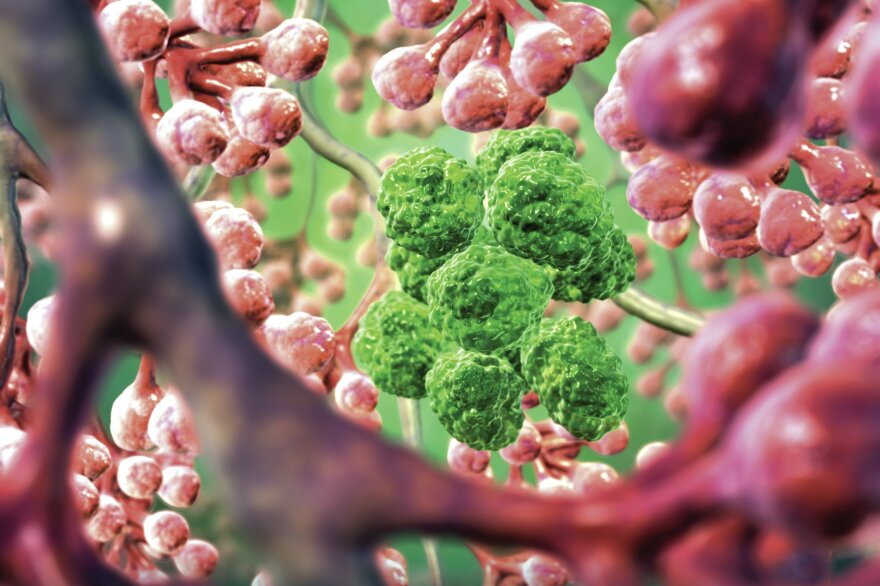One of these days, there could well be a simple blood test that can help diagnose and track cancers. We aren't there yet, but a burst of research in this area shows we are getting a lot closer.
In the latest of these studies, scientists have used blood samples to identify people with lung cancer.
At the Stanford School of Medicine, Dr. Maximilian Diehn spends some of his time as a radiation oncologist treating patients with cancer, and some of his time delving into the world of DNA. In particular, he's been working on ways to detect DNA that has been shed from a tumor and ends up in a patient's blood.
"The problem has been that there's a very small amount of the DNA there, usually, so it's very hard to detect," Diehn says.
If there is cancer DNA in the body left, that suggests there are still cancer cells left, so that patient is probably not cured.
But new technologies allow him to find tiny amounts of DNA and scan large parts of it to look for mutations that come from tumors. And that opens up all sorts of possibilities.
"The initial impetus was having something I could use in my own patients ... as a blood test that would let us both detect the presence of cancer as well as monitor how a patient's cancer responds to various treatments," he says.
Right now, doctors often just wait and hope. And it can take months or even years to see whether a cancer treatment has worked.
But Diehn and his colleagues say they've developed an exquisitely sensitive DNA test that can tell them right away whether there is tumor left in a patient.
"If there is cancer DNA in the body left, that suggests there are still cancer cells left, so that patient is probably not cured," he says, "whereas if the cancer DNA is gone, that suggests the patient is likely to be cured."
And if the cancer is still there, they can try other treatments.
Their new experimental test is specific for lung cancers — non-small-cell lung cancers, to be precise. They report in Nature Medicine that they were able to detect tumor DNA in every patient they studied who had a more advanced cancer (stage 2 or higher). And, more remarkably, they have been able to detect very early stage 1 lung cancer about half the time (with a test they're still working to perfect).
"Now, since we can already detect half of them with the current assay, we're very hopeful that the majority of cases will have detectable DNA," Diehn says.
Researchers at Stanford not only are working to improve the lung-cancer test but also are developing tests for other cancers — including lymphomas, cancers of the breast, esophagus and pancreas.
"But the ultimate holy grail would be to move this to the early detection of cancer," says Dr. Ash Alizadeh at Stanford. "The early detection of cancer could save many lives by being amenable to being treated."
They aren't the only lab on that quest. Dr. Luis Diaz and colleagues at the Johns Hopkins School of Medicine recently reported a blood DNA test targeting 14 different tumor types. The team at the Hopkins Kimmel cancer center also found about half of the early-stage cancers in their volunteers. Diaz says even a test that finds early stage cancer only half the time is still a big step forward.
"When you have a stage 1 tumor, the patients feel healthy," Diaz says. "They're still going to the gym, they're still performing all their activities of daily living without any sort of feeling that something's wrong. This blood test will detect the cancer at a very early stage — albeit only in 50 percent of cases."
The researchers are optimistic they can improve the test so it will catch many more cases, but they don't yet know whether that's a matter of better technology or if some tumor DNA will simply always remain hidden. And it's not entirely clear yet how many false alarms might turn up. But even now, this emerging DNA technology has many uses.
"For me this is very exciting because there is momentum building in this field," Diaz says. Many skilled and capable research groups are diving into this field, so "what we're going to see is really cool questions answered that we couldn't have answered in any other way."
And while new medical technologies often drive up the cost of care, these researchers hope that a few years from now, a cancer blood test will be available for a few hundred dollars. Using it could help patients avoid costly scans — and avoid late-stage diagnoses, when cancer is often more difficult and more expensive to treat.
Copyright 2021 NPR. To see more, visit https://www.npr.org. 9(MDA3OTgyNDI4MDEzMTM0MjQzMTZlNDI0Mg004))



